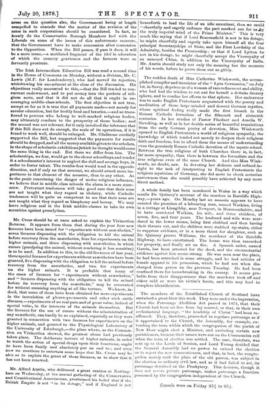The Irish Intermediate Education Bill was read a second time
in the House of Commons on Monday, without a division, Mr. C. Lewis (M.P. for Londonderry), who had moved its rejection, withdrawing his amendment at the close of the discussion. His objections really amounted to this,—that the Bill tended to con- current endowment, and to put money into the pockets of reli- gious sects, and that it did not do all that it ought in en- couraging middle-class schools. The first objection is not true, except so far as it is true that all payments made—not merely for secular education, but for bodily food and luxuries,—and so trans- ferred to persons who belong to well-marked religious bodies, may ultimately conduce to the prosperity of those bodies ; and the second was not relevant, for it only involved the inference that if this Bill does not do enough, the scale of its operations, if it is found to work well, should be enlarged. Mr. Gladstone cordially supported the Bill, but suggested that the payments for results should be dropped, and all the money available given to the scholars, in the shape of scholastic exhibitions,1which be thought would come the same thing in the end. But there we differ from him. The scholarships, we fear, would go to the clever schoolboys,and render it a schoolmaster's interest to neglect the dull and average boys, in order to foster talent. The results-fees would tend in the opposite direction, and if only on that account, we should attach more im- portance to that element of the measure, than to any other. As to the panic concerning the danger of undue religious influence, we believe that in middle class schools the alarm is a mere scare- crow. Protestant tradesmen will take good care that their sons are not taught what they regard as idolatry, while Catholic tradesmen will be quite as competent to see that their sons are not taught what they regard as blasphemy and heresy. We may leave religious zeal in the Irish middle-classes to take its own securities against proselytism.


































 Previous page
Previous page